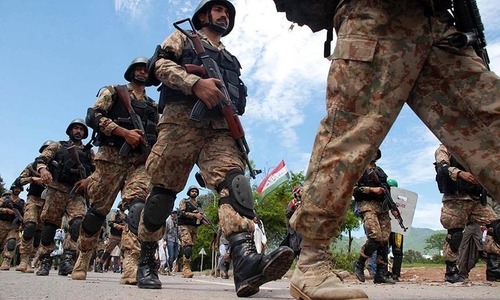ISLAMABAD: The political situation emerging in the wake of a controversy over the Khatm-i-Nabuwwat declaration and amendment to the election law that allowed Nawaz Sharif to be re-elected as president of the Pakistan Muslim League-N (PML-N) has forced the government to drop plans for an across-the-board accountability mechanism covering institutions commonly deemed “sacrosanct”, according to a minister.
Speaking at a press conference along with Interior Minister Ahsan Iqbal and Adviser to the Prime Minister Barrister Zafarullah Khan, Law Minister Zahid Hamid said the government was not bringing any law against the army and the judiciary. He referred to a proposal made by a senior PPP lawmaker about defining public office-holders in the new accountability law as “all those who draw salaries from the national exchequer” and said a consensus on it could not be reached. “We also have reservations over it,” said the minister.
Mr Hamid said that representatives of all the parties had been asked to consult their leadership over it before they attend the next meeting of the Parliamentary Committee on National Accountability Law.
He was asked to comment on a statement made by a politician from Rawalpindi in which the latter had warned that the government was set to bring a law against the army and the judiciary.
During a recent discussion in the Senate on the accountability law, lawmakers from both sides of the aisle had called for an across-the-board accountability law, with no room for the “sacred cows”.
On the occasion, Interior Minister Iqbal said that those losing in the political arena had adopted a new line of action out of frustration and wanted to pit the PML-N against the army. “They continue to run a disinformation campaign in their quest for an extra-constitutional step.”
He said that at times Sheikh Rashid posed as a spokesman for the Pakistan Army and at others as a registrar of the apex court. He said state institutions should take notice of all this.
Deploring the recent incident in which the PML-N leaders had been stopped from entering the Federal Judicial Complex when Nawaz Sharif was appearing before a judge there, Mr Iqbal said that investigations were under way and that it would be unfair to offer any comment before the exercise was completed.
He, however, stressed that constitutional governance and democratic continuity were as essential for the country as oxygen was for any human being. Whenever a country steers out of the democratic course it suffers a great loss. “Every course other than democracy leads to devastation,” he said.
The interior minister expressed the confidence that the government would complete its constitutional term on June 5, and said the next general elections would be held within 60 days of the expiry of the term.
Answering a question, he indicated that Mr Sharif’s children would not appear before the accountability court on the next date of hearing. Highlighting the importance of family values, he pointed out that their mother Kulsoom Nawaz was still recovering from surgical operations.
While talking to Dawn, Mr Iqbal denied that the army had played a behind-the-scenes role in restoration of the Khatm-i-Nabuwwat declaration in the election laws. “It was a decision taken by the political leadership,” he insisted.
He regretted that certain elements were running a campaign on the social media over the sensitive issue to advance their political agenda.
He warned that action would be taken under the cybercrime laws against those misusing technology.
Published in Dawn, October 7th, 2017














































